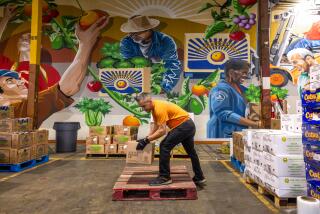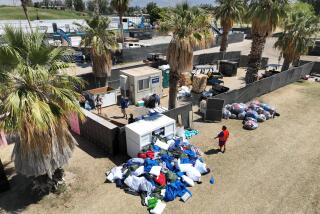At 7, Alex Has Learned the Value of Giving
- Share via
The donations came from grandmothers and businessmen, from a ladies’ golf club in Morro Bay and a bowling team in the Palisades, from schools and churches and Girl Scout troops . . . more than a million dollars, raised locally, now on its way to Central America to help homeless victims of Hurricane Mitch.
There were dollar bills pinned to handwritten notes, corporate checks in six-figure amounts, plastic bags full of baby supplies. But few gifts were more touching than this one--and its explanation--which arrived at the American Friends Service Committee office in Pasadena:
The enclosed check for $34.50 is a donation from my 7-year-old son, Alex. That is the total amount of money that Alex had in his piggy bank.
When I asked him if he was sure he wanted to give the children all of his money, or keep a little bit, he said, “Mom, they need it more than I do. Please send it all.” So here it is. We appreciate your efforts, and Alex hopes it helps.
Sincerely,
Alex’s proud mom, Paula
*
Before he pried it open to give its contents away, Alex Sheftel’s piggy bank held the sum total of the boy’s net worth.
Years of birthday money and tooth fairy gifts, coins he had found on the street near his home, the proceeds from his lemonade stand. . . . Every penny he ever received went straight into the handmade bank--actually an old food container he kept hidden in an ice chest in the family’s pantry.
He figured to spend it on candy or toys; or maybe he’d haul it out and surprise his mom the next time she told him the sneakers he wanted were too expensive or they couldn’t afford pizza for dinner again.
But candy and toys lost their luster for this first-grader when he heard his mother talk about Hurricane Mitch and how it had swept through Central America, leaving millions of children sick, starving and homeless, in desperate need of the most basic supplies.
“He didn’t even know what a hurricane was,” his mother recalls. “So I explained and told him I was going to send money to help them out. And he said, ‘I have money in my piggy bank. I can send that to help them, too.’ ”
It took forever for him to tally it up . . . and it surprised him to learn that the hundreds of nickels, quarters, dimes and pennies he had collected over the years amounted to 34 dollars and 50 cents.
“I thought maybe I had about $20 or something,” he said. “There was a lot of money in that bank. . . .”
*
It was hardest to part with his $10 bill--the first money he’d ever earned, profits from the lemonade stand he ran last summer with his little sister, Rachel.
His mom gave him permission to hold it back. “I asked him,” Paula Sheftel said, “ ‘How much do you want to give?’ ” Again, she told him: “You don’t have to send it all, you know.”
Alex was tempted, but he handed it over.
“I wanted to keep it,” he admits. “But I didn’t want any more people to die. I think those kids need it more than me. It seemed like the right thing to do.”
Paula Sheftel was not surprised. Alex, she says, has always been empathetic, sensitive to other children’s needs, “one of those kids who, if someone’s getting picked on at school, he’ll step up and try to help.”
Maybe it’s because he struggles daily with challenges of his own.
Alex was born with a hole in his heart, a defect remedied with surgery that saved his life but left him marked. “He has this very large scar,” his mother says, “that other kids notice.” He has asthma, allergies . . . limitations that keep him on the fringes and let him know how it feels to not fit in.
Still, he’ll tell you his life is good. He lives with his parents and sister in a comfortable home in Santa Monica. Money has been tight recently--the family once owned a chain of five yogurt shops, and only one remains--but there is always enough to pay for doctor visits and the food and clothes they need.
And for as long as Alex can recall, charity has been a part of the family’s creed.
“At least once a month when we do our marketing, we buy extra canned goods for the West Side Food Bank,” his mother says. “And ever since he was 2 or 3, I’ve always let Alex come with me to take the food in. That way he can see what it feels like, helping others.”
It seems he’s learned the lesson well.
His only twinge of remorse over his disaster relief largess comes when he passes those big red Salvation Army kettles collecting for the needy during the holidays . . . and he has no more money to drop inside.
* Sandy Banks’ column is published on Sundays and Tuesdays. Her e-mail address is sandy.banks@latimes.com.
More to Read
Sign up for Essential California
The most important California stories and recommendations in your inbox every morning.
You may occasionally receive promotional content from the Los Angeles Times.













